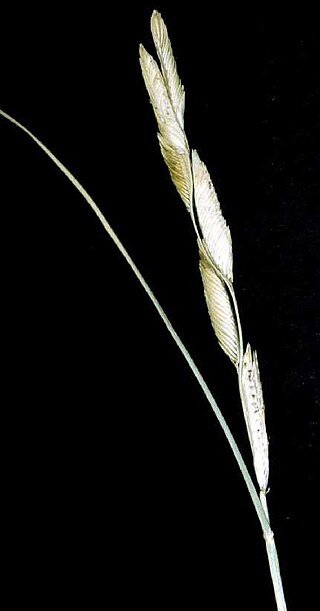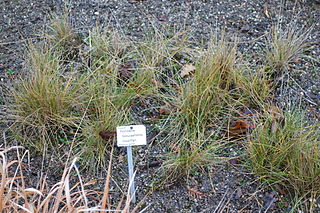
Molinia, or moor grass, is a genus of two species of flowering plants in the grass family, native to damp moorland in Eurasia and northern Africa. They are both herbaceous perennial grasses.

Puccinellia is a genus of plants in the grass family, known as alkali grass or salt grass.

Digitaria sanguinalis is a species of grass known by several common names, including hairy crabgrass, hairy finger-grass, large crabgrass, crab finger grass, purple crabgrass. It is one of the better-known species of the genus Digitaria, and one that is known nearly worldwide as a common weed. It is used as animal fodder, and the seeds are edible and have been used as a grain in Germany and especially Poland, where it is sometimes cultivated. This has earned it the name Polish millet.

Catabrosa is a small but widespread genus of plants in the grass family native to temperate areas of Eurasia, the Americas, and a few places in Africa.

Paspalum dilatatum is a species of grass known by the common name dallisgrass, Dallas grass, or sticky heads. It is native to Brazil and Argentina, but it is known throughout the world as an introduced species and at times a common weed. Its rapid growth and spreading rhizomes make it an invasive pest in some areas. It is present in the southern half of North America, southern Europe, much of Africa, Australia, New Zealand, and many tropical and subtropical areas.

Paspalum distichum is a species of grass. Common names include knotgrass, water finger-grass, couch paspalum, eternity grass, gingergrass, and Thompson grass. Its native range is obscure because it has long been present on most continents, and in most areas it is certainly an introduced species. Its native range probably includes parts of the tropical Americas.

Melinis repens is a species of grass known by the common names rose Natal grass, Natal red top, or simply Natal grass. It is native to southern Africa and an introduced species, often considered a noxious weed, on other continents such as North America and Australia. It is an annual or perennial grass, growing up to a meter tall. Its growth rate is dependent on temperature. The inflorescence is an open array of branches bearing spikelets densely coated in silky white or pink. In Chishona, its name is bhurakwacha.
Puccinellia howellii is a rare species of grass known by the common name Howell's alkaligrass. It is endemic to Shasta County, California, where it is known from a single population in Whiskeytown National Recreation Area near Whiskeytown. Its entire population is contained in a 1-acre (4,000 m2) complex of three saline mineral springs directly next to Highway 299. The grass was first described to science in 1990 and no other populations were discovered despite extensive searches of the area.

Puccinellia lemmonii is a species of grass known by the common name Lemmon's alkaligrass. It is native to western North America, particularly the northwestern United States, where it grows in moist, saline soils.
Puccinellia nutkaensis is a species of grass known by the common names Nootka alkaligrass and Alaska alkali grass. It is native to North America from Alaska across northern Canada to Greenland and Nova Scotia, and down to Washington to Oregon to the Central Coast of California.

Puccinellia nuttalliana is a species of grass known by the common name Nuttall's alkaligrass. It is native to North America, where it is widespread from Alaska east throughout Canada to Greenland, and common in the western and central United States. It is present in the Arctic, throughout the temperate mountain ranges, the Great Plains, the Great Basin, and along the western coastline of North America down through California.
Puccinellia parishii is an uncommon species of grass known by the common names bog alkaligrass and Parish's alkali grass. It is native to the western United States, where it is known from a few locations in Arizona and New Mexico, and one occurrence each in California and Colorado.
Puccinellia pumila is a species of grass known by the common names dwarf akaligrass and smooth alkali grass. It is native to North America where it grows along the coastline in the northern latitudes, from Alaska across Arctic northern Canada to Greenland. It occurs on the coast of the Pacific Northwest in the United States and it is known from the Kamchatka Peninsula. The grass is only found on the coast, in wetland habitat, beaches, and areas inundated by the highest tides, in saline sand and mud. This perennial grass grows decumbent or erect to a maximum height near 40 centimeters, often remaining much smaller, especially in harsh habitat. It may root at stem nodes which become buried in wet substrate. The inflorescence is a dense or open array of branches bearing spikelets.

Puccinellia simplex is a species of grass known by the common names California alkaligrass and western alkali grass. It is native to California, where it grows in mineral springs and other moist habitat with saline soils in the Central Valley, Mojave Desert, and other areas. It is also known from Utah, but occurrences there are probably introduced. This annual grass grows up to about 25 centimeters tall. The inflorescence is generally a linear structure with parallel branches bearing small spikelets.

Sporobolus hookerianus is a species of grass known by the common name alkali cordgrass.

Ventenata dubia is a species of grass known by the common names North Africa grass and wiregrass. It is native to southern Europe, North Africa and the Middle East. It is becoming well known in North America, where it is an introduced species and a noxious weed of cultivated and disturbed habitat. It is problematic in the Pacific Northwest, where it was first identified in Washington in 1952 and Idaho in 1957. It was found in Utah in 1996. It probably spreads when it gets mixed in with grass seed and is transported and inadvertently planted.

Puccinellia maritima is a species of grass known by the common names including seaside alkaligrass, common saltmarsh-grass or sea poa grass. It is native to Western Europe and it is present in most of North East North America. It grows in moist, usually saline soils. It can reach a height of 80 cm and has greyish-green leaves.

Puccinellia festuciformis is a species of grass.

Puccinellia fasciculata, or Borrer's saltmarsh grass, is an annual grass native to coasts of Europe and introduced to the northern east coast of North America. Its diploid number is 28.
Christina Mayne Dony was an English botanist and athlete.















